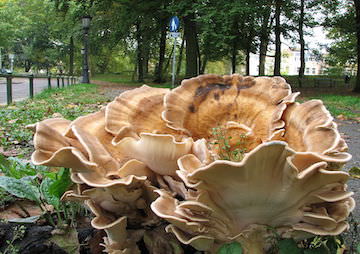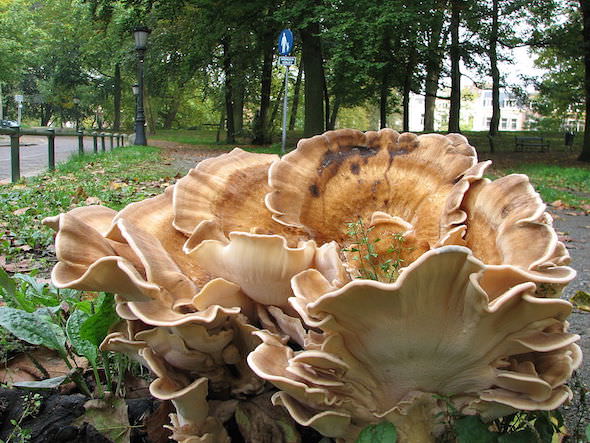Climate Models May Misjudge Soils’ Carbon Emissions
How soil organisms cope with decaying vegetation is much less certain than climate models suppose, researchers say, and carbon emission estimates may be wrong.
By Alex Kirby, Climate News Network

Climate models may have mistaken the role of both fungi and bacteria in decomposition. (Dohduhdah via Wikimedia Commons)
This Creative Commons-licensed piece first appeared at Climate News Network.
LONDON — Some of the microscopic creatures which live in the soil are able to digest dead plants and trees, turning their contents into gas and minerals.
But researchers say their work show that our understanding of how organic material is decomposed is fundamentally wrong, calling into question some current climate models.
The researchers, from Lund University, Sweden, and the University of New Hampshire, USA, have published their study in the journal Ecological Monographs. They say it means that climate models which include micro-organisms in their estimates of future climate change must be reconsidered.
When plants or trees die, their leaves and branches fall to the ground and the organic matter which is absorbed by the soil is then decomposed, mainly by the activity of fungi and bacteria, which convert the dead materials into the main greenhouse gas, carbon dioxide, and mineral nutrients.
Until now, the Lund team says, scientists had thought that high-quality organic materials, such as leaves that are rich in soluble sugars, were mainly decomposed by bacteria, leaving the lower-quality matter, like cellulose and lignin, to be broken down mainly by fungi.
Expectations confounded
Previous research has suggested that organic material decomposed by fungi results in less CO2 and nutrient leakage compared with matter decomposed by bacteria.
This is important for the climate models in use today, as any change in the loss of CO2 and mineral nitrogen would alter the soil’s contribution to greenhouse gases and eutrophication, the process in which the release of excessive chemical pollution causes algal blooms in watercourses.
The researchers have now examined the relative significance of fungal and bacterial decomposition over a 23-year period. “In contrast with expectations, there was no evidence that high-quality organic material was mainly broken down by bacteria. In fact, the data strongly suggested the contrary”, says Johannes Rousk, researcher in microbial ecology at Lund.
“There was also no evidence to suggest that organic material broken down by fungi reduced the leakage of carbon dioxide into the atmosphere, or the leakage of nutrients. Once again, the results tended to suggest the contrary”, he says.
He and his co-author, Serita D Frey, say the results could have consequences not only for climate models, but also for current policies on land use intended to encourage fungi, which they think may be based on flawed assumptions about the role of fungi in reducing environmental damage.
New models
But they cannot say precisely what the significance of their findings may prove to be for greenhouse gases. Dr Rousk told the Climate News Network: “Current models for carbon and nutrient turnover used by the IPCC, for example, and other organisations offering advice to governments do not yet explicitly incorporate microbial communities.
“A new generation of models is under development that have begun to do this. These will be affected by our results, which challenge current beliefs held in soil microbial ecology.
“So our results will not directly affect current models or their predictions, but the development of next generation models. It is probably not possible to conclude whether the models in use today have led to over-estimates of releases, or the opposite.
“By revising the interpretation of fungal and bacterial roles in decomposition, and their potential for carbon and nutrient release from soils, our results will hopefully reduce the ‘noise’ in the models and increase the precision of predictions.”
Decomposition and other soil processes are estimated to account for nearly 30% of all naturally-produced CO2 emissions.
Your support matters…Independent journalism is under threat and overshadowed by heavily funded mainstream media.
You can help level the playing field. Become a member.
Your tax-deductible contribution keeps us digging beneath the headlines to give you thought-provoking, investigative reporting and analysis that unearths what's really happening- without compromise.
Give today to support our courageous, independent journalists.






You need to be a supporter to comment.
There are currently no responses to this article.
Be the first to respond.